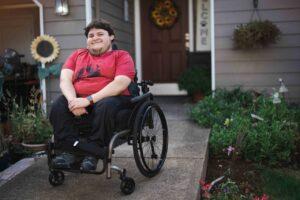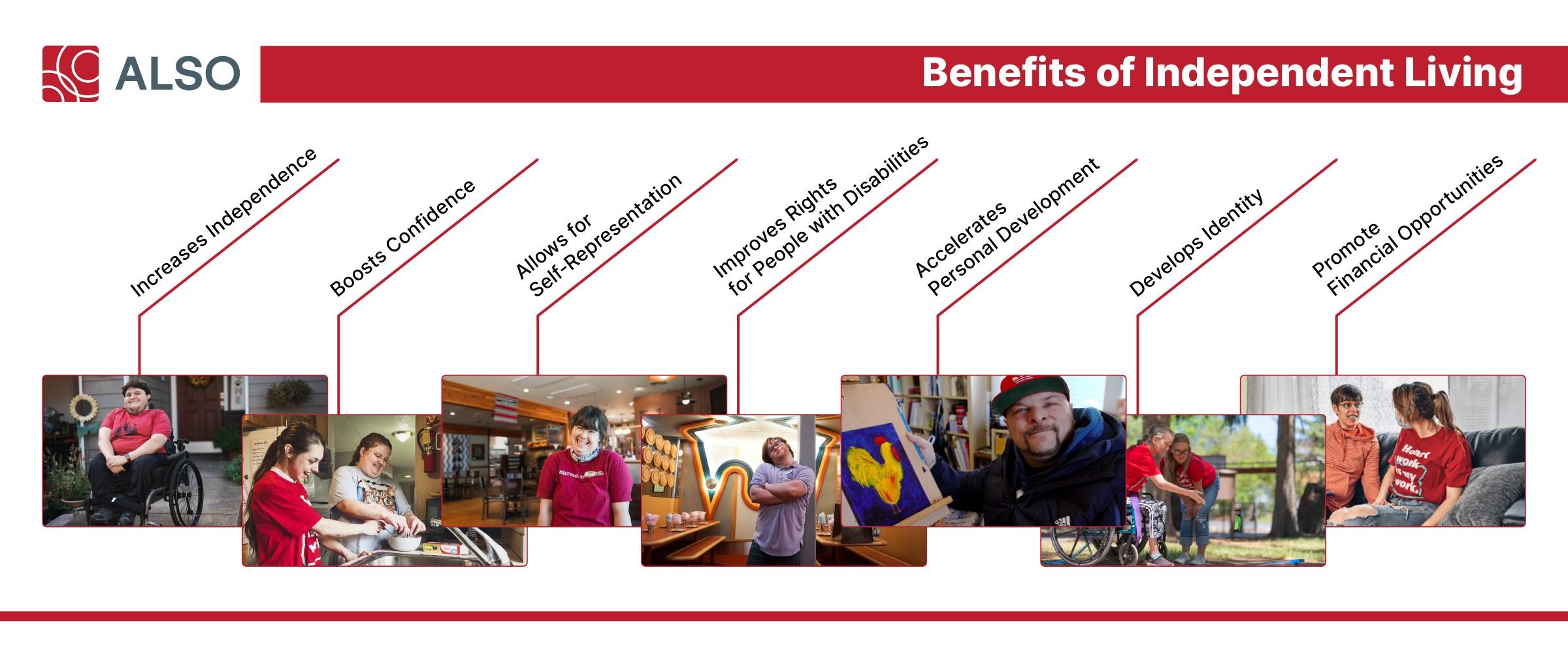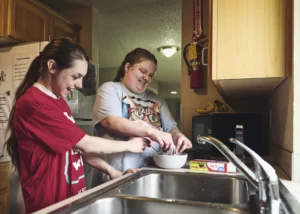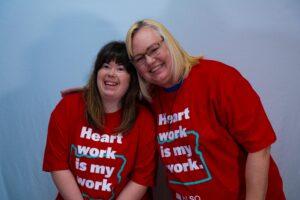Explore the ALSO Children’s Homes Wishlist and help fill the season with joy for the children supported by ALSO.
Explore the ALSO Children’s Homes Wishlist and help fill the season with joy for the children supported by ALSO.

The ability to live independently is something most of us take for granted. Within the limits of things such as income and the location of our job, we get to choose the home, career, recreational activities, and friends, that make us happy and content. Let’s not forget the freedom of simple pleasures such as choosing:
For a large part of the global population, including those living in the United States, these freedoms have been elusive. Fortunately, people with disabilities and their advocates have passionately fought to secure equal access to independent living opportunities that those without disabilities experience every day.
Learn more about what independent living is, how the concept of independent living has evolved over the years, and the impact independent living has on the lives of people with disabilities below.

Simply put, independent living is having the opportunity to live like everyone else. Elements of independent living include activities such as living on one’s own and getting a job that pays the bills, but it’s much more than that. At the core is something much bigger: the right to self-determination. This right refers to the opportunity to make choices and determine a course of action, even if it results in mistakes. Fortunately, we learn from those mistakes and move forward with new ideas about achieving goals. People living with disabilities go through the same process.
Independent living philosophy is based on the assumption that individuals with disabilities deserve the same civil rights as people without disabilities. This includes control over their own lives, such as where to live, attend school, work, and a choice of social activities. It embraces the conviction that people with disabilities deserve equal opportunities to contribute to and participate fully in community life.
Self-determination is a major element in this philosophy. Examples of self-determination include the following.
Another principle of the independent living philosophy is that the person with a disability is the expert in the task of meeting life-goals, not multiple healthcare professionals and human service providers that are employed to provide assistance. Although these specialists have valuable expertise in independent living services, they must provide support and guidance, rather than authority and direction.
The independent living movement has evolved over the centuries. Beginning around the 1800’s, activists, persons with disabilities, and other advocates have slowly changed society’s views.
Ed Roberts is considered by many as the “father of the independent living movement.” In 1953, this 14-year-old athlete contracted polio. He returned home from multiple hospitalizations. Fortunately, Ed’s mother, a labor union organizer, instilled in young Ed that anyone could do anything. She helped her son to arrange to attend classes by telephone.
As Ed got more involved in education, he realized that he had the ability to make a difference in the world. As more affordable and portable ventilators came along, he started attending classes in person and eventually graduated from high school. The strong self-advocacy skills that he had acquired propelled his eventual enrollment at UC Berkeley. It was no small task to obtain critical personal assistance services, and various types of technical assistance. In 1972, Ed’s advocacy, along with the disability activism of many peers and colleagues, gave rise to the first Center for Independent Living.
Ed’s amazing impact in California wasn’t an isolated event. Disability advocates across the nation were steadily breaking down barriers that created isolation in nursing facilities, sheltered workshops, and other institutions. They demanded to live on their own terms, rather than being marginalized. Independent living centers sprung up throughout the country.
A plethora of governmental and community-based organizations followed throughout the following decades. Major state/federal laws literally changed lives. Just a few notable legal changes were:
LEARN MORE: About Statewide Independent Living Councils and what they do for independent living programs and high-quality service delivery.

The very experience of being able to live in the least restrictive environment would give anyone numerous opportunities to practice daily living skills:
Let’s not forget those personal abilities that make communities a better place to live:
As we experience improvements in independent living skills throughout our day, it reinforces confidence in progressively performing more challenging tasks. Self-confidence rises as we discover how we can learn from our mistakes.
This is the ability and confidence to speak up about one’s own interests, needs, and preferences. Often, when we think of self-representation, we think of civil rights. This is true, but it also includes the ability to say, express an opinion, request respect from others, or confidently resign from a job.
When people really get to see how well our neighbors with disabilities can contribute to their communities, it offers proof that they deserve the same civil rights protections as anyone else. It’s a much better option for a civilized society than isolating individuals in institutions, sheltered workshops, and foster homes.
LEARN MORE: How Oregon’s disability employment rights laws paved the way for individual empowerment.
When we are supported in living in an environment of our own choosing, we naturally start exploring what makes us “tick.” Some of us learn that painting or working in the garden offers a sense of calm and relaxation. Others of us discover how much we really need to be with our pals during the weekly football game. Independent living allows people with disabilities to develop an identity that is all their own.
Celebrating a first paycheck can be the greatest day of anyone’s life! From an economic standpoint, society is beginning to understand the major role that people with disabilities have in contributing to the local economy through consumerism and paying taxes.
When we envision and work for a culture in which everyone is valued because of the unique things they bring to the table, regardless of disability, ethnic origin, racial background, or sexual orientation, we get to the root of Diversity, Equity, and Inclusion (DE&I). When applied with passion and strong advocacy, DE&I principles progress from simple “buzzwords” to meaningful actions that enrich our individual lives and our identity as an inclusive community.

At ALSO, we believe even individuals who are considered to have significant disabilities can take their place as vital members of community living. We do this by being premier service providers of the following support services for people with developmental and intellectual disabilities. We also have extensive expertise in the areas of accessible housing, so that the people we support can create independent lives of their own choosing.
Assistive technology can increase independence for people with a wide variety of disabilities. We’ve seen how it aids in education, communication, employment, recreational, and social activities. What’s even better is that assistive technology doesn’t need to be expensive or difficult to use. We provide the needed skills training to ensure that those we support feel comfortable and confident.
One of our core services is those with intellectual and developmental disabilities explore and succeed in their chosen careers. Since 2017, ALSO has provided supported employment to an estimated 80 individuals.
We take the time to go collaborate with employers on the types of supports needed for success. The result is really a win-win for employers, employees, and the surrounding community.
ALSO offers greater independence in all aspects of supported living. Our customized support is as unique as the individuals that we serve. This includes in-home supports and community living. Additionally, when someone has mastered the skills to move to an environment that offers greater independence, we’re there front-and-center with high-quality transition services.

At ALSO, we’re passionate about fulfilling the independent living philosophy for everyone with intellectual and developmental disabilities we support. We’ve been doing this for over 25 years and continue to dedicate all energies and efforts to full community inclusion. We welcome you to check out our Blogs and Other Resources, our Make an Impact page, or call (503) 489-6565 to learn more.

Sign up for our newsletter to get our latest news, content, and job opportunities.
Help us ensure that everyone has the same opportunities in their home, workplace and community. Let’s make dreams!
